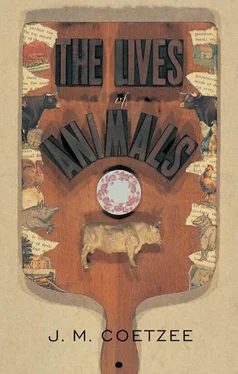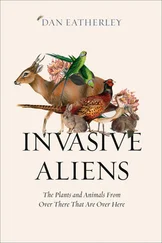“I want to say at the outset that that was not how my remark—the remark that I feel like Red Peter—was intended. I did not intend it ironically. It means what it says. I say what I mean. I am an old woman. I do not have the time any longer to say things I do not mean.”
His mother does not have a good delivery. Even as a reader of her own stories she lacks animation. It always puzzled him, when he was a child, that a woman who wrote books for a living should be so bad at telling bedtime stories.
Because of the flatness of her delivery, because she does not look up from the page, he feels that what she is saying lacks impact. Whereas he, because he knows her, senses what she is up to. He does not look forward to what is coming. He does not want to hear his mother talking about death. Furthermore, he has a strong sense that her audience—which consists, after all, mainly of young people—wants death-talk even less.
“In addressing you on the subject of animals,” she continues, “I will pay you the honor of skipping a recital of the horrors of their lives and deaths. Though I have no reason to believe that you have at the forefront of your minds what is being done to animals at this moment in production facilities (I hesitate to call them farms any longer), in abattoirs, in trawlers, in laboratories, all over the world, I will take it that you concede me the rhetorical power to evoke these horrors and bring them home to you with adequate force, and leave it at that, reminding you only that the horrors I here omit are nevertheless at the center of this lecture.
“Between 1942 and 1945 several million people were put to death in the concentration camps of the Third Reich: at Treblinka alone more than a million and a half, perhaps as many as three million. These are numbers that numb the mind. We have only one death of our own; we can comprehend the deaths of others only one at a time. In the abstract we may be able to count to a million, but we cannot count to a million deaths.
“The people who lived in the countryside around Treblinka— Poles, for the most part—said that they did not know what was going on in the camp; said that, while in a general way they might have guessed what was going on, they did not know for sure; said that, while in a sense they might have known, in another sense they did not know, could not afford to know, for their own sake.
“The people around Treblinka were not exceptional. There were camps all over the Reich, nearly six thousand in Poland alone, untold thousands in Germany proper.{Daniel J. Goldhagen, Hitler’s Willing Executioners (London: Little Brown, 1996), 171.} Few Germans lived more than a few kilometers from a camp of some kind. Not every camp was a death camp, a camp dedicated to the production of death, but horrors went on in all of them, more horrors by far than one could afford to know, for one’s own sake.
“It is not because they waged an expansionist war, and lost it, that Germans of a particular generation are still regarded as standing a little outside humanity, as having to do or be something special before they can be readmitted to the human fold. They lost their humanity, in our eyes, because of a certain willed ignorance on their part. Under the circumstances of Hitler’s kind of war, ignorance may have been a useful survival mechanism, but that is an excuse which, with admirable moral rigor, we refuse to accept. In Germany, we say, a certain line was crossed which took people beyond the ordinary murderousness and cruelty of warfare into a state that we can only call sin. The signing of the articles of capitulation and the payment of reparations did not put an end to that state of sin. On the contrary, we said, a sickness of the soul continued to mark that generation. It marked those citizens of the Reich who had committed evil actions, but also those who, for whatever reason, were in ignorance of those actions. It thus marked, for practical purposes, every citizen of the Reich. Only those in the camps were innocent.
“‘They went like sheep to the slaughter.’ ‘They died like animals.’ ‘The Nazi butchers killed them.’ Denunciation of the camps reverberates so fully with the language of the stockyard and slaughterhouse that it is barely necessary for me to prepare the ground for the comparison I am about to make. The crime of the Third Reich, says the voice of accusation, was to treat people like animals.
“We—even we in Australia—belong to a civilization deeply rooted in Greek and Judeo-Christian religious thought. We may not, all of us, believe in pollution, we may not believe in sin, but we do believe in their psychic correlates. We accept without question that the psyche (or soul) touched with guilty knowledge cannot be well. We do not accept that people with crimes on their conscience can be healthy and happy. We look (or used to look) askance at Germans of a certain generation because they are, in a sense, polluted; in the very signs of their normality (their healthy appetites, their hearty laughter) we see proof of how deeply seated pollution is in them.
“It was and is inconceivable that people who did not know (in that special sense) about the camps can be fully human. In our chosen metaphorics, it was they and not their victims who were the beasts. By treating fellow human beings, beings created in the image of God, like beasts, they had themselves become beasts.
“I was taken on a drive around Waltham this morning. It seems a pleasant enough town. I saw no horrors, no drug-testing laboratories, no factory farms, no abattoirs. Yet I am sure they are here. They must be. They simply do not advertise themselves. They are all around us as I speak, only we do not, in a certain sense, know about them.
“Let me say it openly: we are surrounded by an enterprise of degradation, cruelty, and killing which rivals anything that the Third Reich was capable of, indeed dwarfs it, in that ours is an enterprise without end, self-regenerating, bringing rabbits, rats, poultry, livestock ceaselessly into the world for the purpose of killing them.
“And to split hairs, to claim that there is no comparison, that Treblinka was so to speak a metaphysical enterprise dedicated to nothing but death and annihilation while the meat industry is ultimately devoted to life (once its victims are dead, after all, it does not burn them to ash or bury them but on the contrary cuts them up and refrigerates and packs them so that they can be consumed in the comfort of our homes) is as little consolation to those victims as it would have been—pardon the tastelessness of the following—to ask the dead of Treblinka to excuse their killers because their body fat was needed to make soap and their hair to stuff mattresses with.{Philippe Lacoue-Labarthe: “The extermination of the Jews … is a phenomenon which follows essentially no logic (political, economic, social, military, etc.) other than a spiritual one.” “The Extermination is … the product of a purely metaphysical decision.” Heidegger, Art and Politics (Oxford: Blackwell, 1990), 35, 48.}
“Pardon me, I repeat. That is the last cheap point I will be scoring. I know how talk of this kind polarizes people, and cheap point-scoring only makes it worse. I want to find a way of speaking to fellow human beings that will be cool rather than heated, philosophical rather than polemical, that will bring enlightenment rather than seeking to divide us into the righteous and the sinners, the saved and the damned, the sheep and the goats.
“Such a language is available to me, I know. It is the language of Aristotle and Porphyry, of Augustine and Aquinas, of Descartes and Bentham, of, in our day, Mary Midgley and Tom Regan. It is a philosophical language in which we can discuss and debate what kind of souls animals have, whether they reason or on the contrary act as biological automatons, whether they have rights in respect of us or whether we merely have duties in respect of them. I have that language available to me and indeed for a while will be resorting to it. But the fact is, if you had wanted someone to come here and discriminate for you between mortal and immortal souls, or between rights and duties, you would have called in a philosopher, not a person whose sole claim to your attention is to have written stories about made-up people.
Читать дальше












